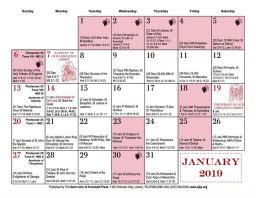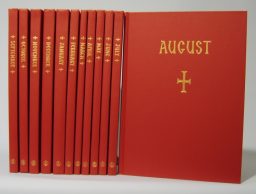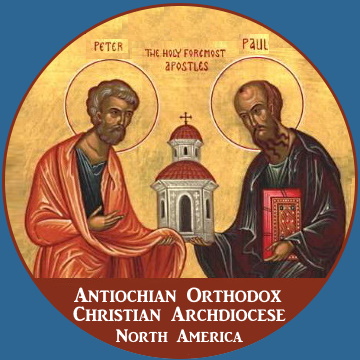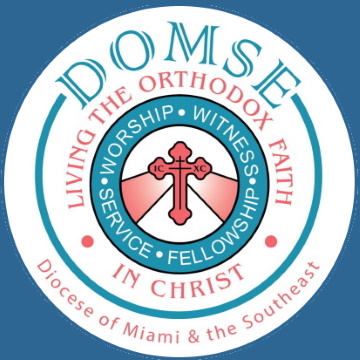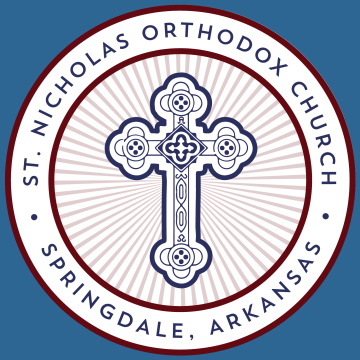This list is offered as an aid to understanding the books and other resources needed to put together an Eastern Orthodox Christian Service with the appropriate hymns and prayers. It is not intended as a replacement for teaching at the hand of a skillful Priest or Chanter, nor could it ever serve as such.
1. Liturgical Calendar
The Eastern Orthodox Liturgical Calendar describes and dictates the rhythm of the life of the Eastern Orthodox Church. Passages of Holy Scripture, saints and events for commemoration are associated with each date, as are many times special rules for fasting or feasting that correspond to the day of the week or time of year in relationship to the major feast days.
- Daily Scripture Reading has today’s Fasting Rule, Gospel, & Epistle from Antiochian.org
- Schedule & Calendar has Service Schedule, the Feasts and Fasts, Church Community Events
- Full 2019 Fasting Chart (PDF)
- Full 2019 Liturgical Chart (PDF)
There are two types of feasts in the Orthodox Church calendar: fixed and movable. Fixed feasts occur on the same calendar day every year, whereas movable feasts change each year. The moveable feasts are generally relative to Pascha (Easter), and so the cycle of moveable feasts is referred to as the Paschal cycle.
2. Online Liturgical Guides
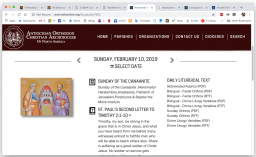
The Online Liturgical Guide provides the official, uniform word-for-word texts to be used for the divine services in all parishes across the Archdiocese. It includes variations in the order of service and the variable texts, Gospel and Epistle readings, and fasting rule for the day.
Antiochian.org is our North American Antiochian Orthodox Archdiocese website. Its Department of Liturgics has a mission that is twofold: both to provide parishes with approved liturgical texts, and to provide education and guidance as to the best and most appropriate practice of liturgics. Because liturgical rubrics and liturgical music share so many overlapping areas of concern, this department also works closely with the Department of Sacred Music.
3. Liturgikon
The Liturgikon (part of the Great Euchologion) is the Book of Divine Services for the Priest and Deacon. It is the Preeminent source for the Antiochian Orthodox Christian Archdiocese of North America.
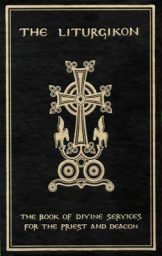
The Liturgikon (also spelled Ieratikon, also known as the Hierotelestikon and the Hieratikon; Slavonic: Sluzhebnik), the “book of the priest,” is the Book of Rites of the Orthodox Church that contains the priest’s prayers for Vespers, Orthros, and Divine Liturgies of St. John Chrysostom, St. Basil the Great, and the Liturgy of the Presanctified Gifts. These texts usually also include additional sections, such as a the Dismissals for various days of the week and for Great Feasts, Prokeimena, the Menologion, Magnifications (Slavonic: Velichaniye) for feast days, and instructional material which explains what clergy should do in the case of various unexpected occurrences in the services.
This book is a “must have” for every Orthodox Clergy Member and Student!
4. Bible
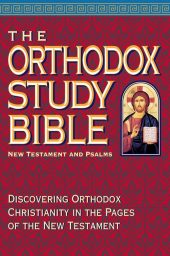
- Old Testament:
- History
- Wisdom
- Psalter
- Prophets
- New Testament
- Gospels
- The Acts of the Apostles
- The Epistles
- The Apocalypse of John
[paragraph]
… more stuff here …
5. “Red” Service Book
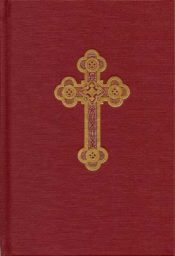
The Service Book of the Holy Eastern Orthodox Catholic and Apostolic Church was the service book used by clergy and faithful in the Antiochian Archdiocese for many years. It is largely deprecated now. However, all of the replacement translations, texts, or service books have not yet been fully fazed into use. So it remains a useful and well loved book now in its twelfth edition.
[paragraph needed]
[paragraph needed]
[paragraph needed]
… the services we use it for and page numbers…
6. Nasser, Divine Prayers & Services
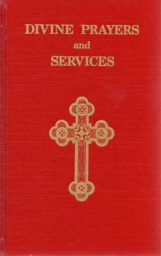
Orthodox prayers and services compiled by the late Reverend Seraphim Nassar. Primarily intended for use by priests and chanters. It is the one liturgical text that still gives you the most material in one volume.
This is one of the oldest English service books around, and the translation is at times awkward, however, with this text, one has enough material to serve Vespers and Liturgy (or Typika) for Sundays and important feast days (though on most Sundays there would be lacking the material from the Menaion, but at least one would have the material from the Octoechos, Triodion, and Pentecostarion for Sundays. One advantage to this text, for those who do not have a liturgical Gospel or Epistle book is that it has the readings for Sundays and Feasts throughout the year (albeit in a sometimes less than ideal translation).
7. The Octoechos
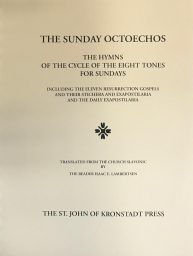
The Octoechos forms the core of most Sunday services, and so this is certainly a text one would want to get early on. There is only one choice in print at present: The Complete Octoechos published by St. John of Kronstadt Press. This contains both the Sunday Octoechos and the Weekday Octoechos in 4 volumes. The Sunday Octoechos, translated by the Monastery of the Veil, has been around longer, but is currently out of print.
Here is the full file address in case you have trouble with the download above. http://StNicholasAR.org/downloads/Octoechos_Complete.pdf
8. The Great Horologion
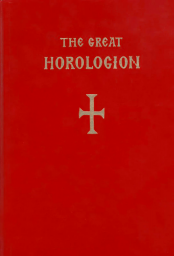
The Horologion is the “Book of Hours,” containing the fixed texts of the services of the Daily Cycle. The Daily Cycle follows this pattern:
- Vespers (sunset)
- Compline (after-dinner) – also known as Apodeipnon
- Midnight Office (12:00am) – also known as Mesonyktikon
- Orthros (sunrise) – also known as Matins
- First Hour (6:00am)
- Third Hour (9:00am)
- Sixth Hour (12:00pm)
- Ninth Hour (3:00pm)
Horologion (Greek: Ωρολόγιον; Slavonic: Chasoslov, Часocлoвъ), or Book of Hours, provides the fixed portions of the services as used by the reader and the chanters. For the sake of convenience, some small portions of the sequences are often included as well, such as feast day troparia, kontakia, and those portions which change according to the day of the week. The Horologion may also contain some devotional material such as the Prayers Before Communion, Thanksgiving After Communion, and Morning and Evening Prayers.
9. The Lenton Triodian
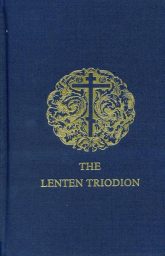
The Lenten Triodion (‘book of the three odes’) it provides many (but not all) of the texts necessary to observe the Great Fast. It contains the Propers for the divine services from the beginning of the pre-Lenten season of preparation (the Sunday of the Publican and Pharisee, the 10th Sunday before Pascha), through Great Lent, and Holy Week. It is the companion text to the Festal Menaion & Pentecostarion.
In Greek and Slavonic it is simply called the Triodion. It is called the Triodion because the canons appointed for Matins during this period are composed of three odes each. The present volume, translation and an extensive and helpful introduction by Metropolitan Kallistos and Mother Mary, was first published by Faber & Faber (London & Boston) in 1978. The companion volume for this book is The Lenten Triodion Supplement.
10. The Menaion (Specifically the Festal)
The Menaion (Greek: Μηναῖον; Slavonic: Минеѧ, Minéya, “of the month”) containing the Propers for fixed dates of the calendar year, (i.e. entities not dependent of the date of Pascha). The Menaion is the largest volume of the Propers for the Byzantine Rite and is used at nearly all the daily services. [ condense this list ]
- The Complete Menaion is published in twelve volumes, one for each month ($1,200.00 set); the first volume is for September which commences the Byzantine liturgical year.
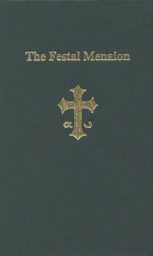
- The Festal Menaion (Slavonic: Минея праздничная) is an abridged version which contains the Propers (variable portions) of the services for nine of the Twelve Great Feasts (those Great Feasts of the Lord or the Theotokos which fall on the fixed cycle). The three excluded feast are the movable feast of Palm Sunday, Ascension, and Pentecost, which can be found in the Triodion and the Pentecostarion. Also contained are some of the other important feasts surrounding the nine included. Some editions also have feasts of the major saints. This edition was translated into English by Bishop Kallistos (Ware) and Mother Mary, and originally published by Faber & Faber (subsequently reprinted by St. Tikhon Orthodox Seminary Press). It is based on the Greek Menaion, but attempts to note major differences with the Slavonic texts, and often provides alternative texts and rubrics accordingly. The book begins by discussing the services of the Church and their structure.
- The General Menaion contains services for each type of celebration (apostles, martyrs, etc.) with blank spaces for the name of the saint(s) commemorated. Originating before the invention of printing when the enormous volume of the complete Menaion could not be copied for every church, this is still used for saints that do not have complete services, e.g., for the patron feast of a church named after a minor saint; it is also used by missions and parishes unable to afford a complete Menaion.
- There are Supplementary Volumes to the Menaion that exist for local saints (e.g., one for all the Saints of the Kiev Caves Monastery, or for newly canonized saints or icons which have their own locally observed feasts.)
Since 1921, there have been predominantly two calendars in use within the Orthodox Church: the Julian Calendar and the Revised Julian Calendar. (Few churches use the Gregorian Calendar.) At the current time there is a thirteen day difference between the two calendars. This means that those churches which use the New Calendar (Revised Julian) will celebrate the feasts on the fixed cycle thirteen days before those who follow the Old Calendar. The other major annual cycle, the Paschal cycle is the same for both Old and New Calendar Churches, so all will celebrate Pascha (Easter) on the same day.
11. Pentecostarian
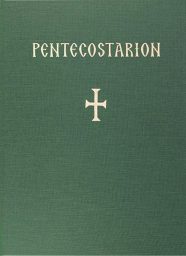
The Pentecostarion (also known as the Flowery Triodion or Festal Triodion) contains the Propers (moveable portions) of the divine services of the Paschal Season from Pascha through the feast of All Saints (the Sunday following Pentecost). It is the companion text to the Festal Menaion & Lenten Triodion.
- Bright Week (Easter Week) – The seven days from the Pascha (Easter Sunday) through the following Saturday
- Paschal Season – The period from Thomas Sunday until Ascension
- Ascension and its Afterfeast
- Pentecost and its Afterfeast
- All Saints Sunday (the Sunday after Pentecost)
12. Psalm Verses of the Orthodox Liturgy
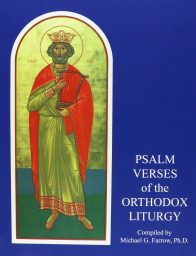
Psalm Verses of the Orthodox Liturgy: According to the Greek and Slavic Usages,
Paperback – April 1, 1999
by Michael G. Farrow, Ph.D. (Author)
This work is the first in English to list all the Psalm verses used in the Divine Liturgy of the Orthodox Church.
Dr Farrow introduces the work with a brief history of the use of psalms in various elements of the liturgy: Antiphons, Entrance Hmns, Prokeimena, Alleluias, and Communion hymns. After some remarks on the translation quoted throughout the work, he concludes the Introduction with guidelines for the use of festal psalm elements in the pre-festal and post-festal periods of the great feasts.
The heart of the book is the detailed setting forth of the psalm verses used in the various parts of the Liturgy, feast by feast, service by service, throughout the year, including Baptism, the Wedding Service, and Funerals, as well as Divine Liturgy. In all, the editor provides all the liturgical psalm verses for 80 services throughout the year, with the result that one can quickly locate the verses needed for the Liturgy for almost any occasion.
At the end is a bibliography, and then three indexes: a general index, an index of verses by psalm number and verse, and an index of psalm phrases.
The book was an invaluable resource when it was first published in 1997, and it remains of great value to clergy, choir directors, singers, chanters, and interested faithful Orthodox.
Dr Michael G. Farrow is a choir director, arranger, and composer who serves in the Antiochian Archdiocese.
13. Services of Initiation
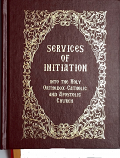
Released March, 2017 for use in the Antiochian Archdiocese of North America, by the Antiochian Orthodox Institute, LaVerne, CA
- Prayers for Mother and Newborn before Baptism
- Holy Baptism
- Chrismation
- First Holy Communion
- Reception of Converts
- Restoration of Formerly Lapsed
- Various Cases of Celebrating Baptism, on feast days and at natural bodies of water
- “Building a Liturgical Library, Some Practical Tips.” St. Jonah Orthodox Church
Dec 2004
http://www.saintjonah.org/services/library.htm - “Liturgical books.” OrthodoxWiki.
19 Nov 2012. Web. 12 Feb 2019.
<https://orthodoxwiki.org/index.php?title=Liturgical_books&oldid=112849>. - Wikipedia contributors. “Liturgical book.” Wikipedia, The Free Encyclopedia.
17 Jul. 2018. Web. 12 Feb. 2019.
<https://en.wikipedia.org/w/index.php?title=Liturgical_book&oldid=850664806>
